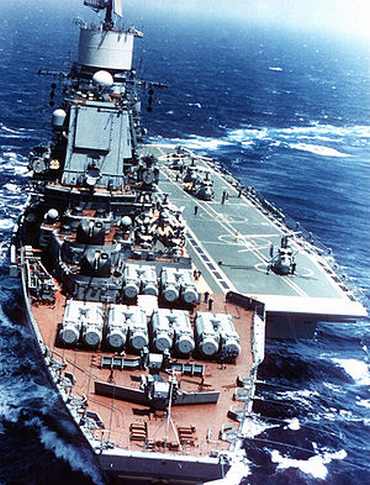 | « Back to article | Print this article |
 Aircraft carrier Admiral Gorshkov will be handed over towards the end of next year, Russia said on Wednesday as India conveyed its "serious concern" over the prolonged delay and asked it to adopt a "wartime approach" for ensuring its early delivery.
Aircraft carrier Admiral Gorshkov will be handed over towards the end of next year, Russia said on Wednesday as India conveyed its "serious concern" over the prolonged delay and asked it to adopt a "wartime approach" for ensuring its early delivery.Antony said he has "suggested that all agencies involved in trials and delivery of the warship must hereafter adopt a wartime approach to complete the trials so that delivery can be as early as possible."
Asked if India was pressing for imposing liquidity damages for the frequent slippages in the delivery schedule of the warship, Antony said, "Other issues we are not discussing here.... not now. Now our main issue is early delivery."
Under the contract terms for the aircraft carrier, there is a provision for imposing a penalty of up to Rs 600 crore for slippages in the delivery schedule of the warship to the Indian navy.
Sharing India's concern over the delay in handing over of the aircraft carrier, Serdyukov said, "We are carrying out a huge inspection to examine the reasons for malfunctions encountered so far and I hope that in April, we shall resume the sea trials."
Updating the Indian side, the Russian minister said large-scale sea trials of the warship have been carried out in the White Sea and the Barents Sea.
Sea trials, he said, were meant to find out malfunctions in the warship. "We need to test...and make sure that we are transferring an operable, a perfect quality ship," he said.
"Such projects are of high sophistication. It is a complicated thing to put together this size of a ship. That is why it takes time and it has taken time already... We are starting a new ship from scratch because this is a complete refitting of an old ship," Serdyukov said.
In his initial remarks at the annual IR-IGMTC meeting to discuss defence ties between the two countries, Antony said, by and large the talks were satisfactory. India, he said, has conveyed its "concern" in some of the areas that came up for discussion.
"We feel that this kind of arrangement will help us to sort out pending issues and we can plan the future course of action. I hope that we will be able to implement all the decisions taken at the commission's meeting so that we can find solutions to the pending issues," he said.
Terming the talks as "significant", the Russian defence minister said a major milestone in relations between the two sides was the induction of Russian nuclear submarine 'INS Chakra' into the Indian Navy.
"We are looking at positive development of Fifth Generation Fighter Aircraft, Multirole Transport Aircraft and the production under licence of the Su-30MKI with India and the T-90 tanks," he said.
On the BrahMos missile joint venture, he said the two sides are working on the "new generation" missiles, which have already been inducted into the Indian Army and Navy.
"We are looking at capacity of 1,000 pieces for this particular missile for India," he said, adding that his country has expressed willingness to upgrade Russian-origin aircraft of the IAF and the infantry combat vehicles of the Indian Army.
The Russian minister said the two sides were also planning to intensify 'INDRA" joint naval exercises along the coast of Mumbai which will include counter-piracy and counter-terrorism manoeuvres.
On the delivery schedule of the FGFA, Serdyukov said, "We are expecting the final certification for the aircraft and initial start of production by the year 2020."
"We have handed over the contract to the Indian party and I think it will be considered and approved by the end of this year. The production under licence of Russian equipment is of utmost essence to India," he added.
The defence ministry sources said Russian side expressed willingness to work on the joint development of the hypersonic version of the supersonic cruise missile Brahmos, besides participation in the Indian programme to build six new submarines. India also plans to procure 71 new Mi-17 V5 helicopters for the IAF and the home affairs ministry, they said.
The Russian side also wants to work on upgrading the Mi-17 IV chopper fleet, they said.